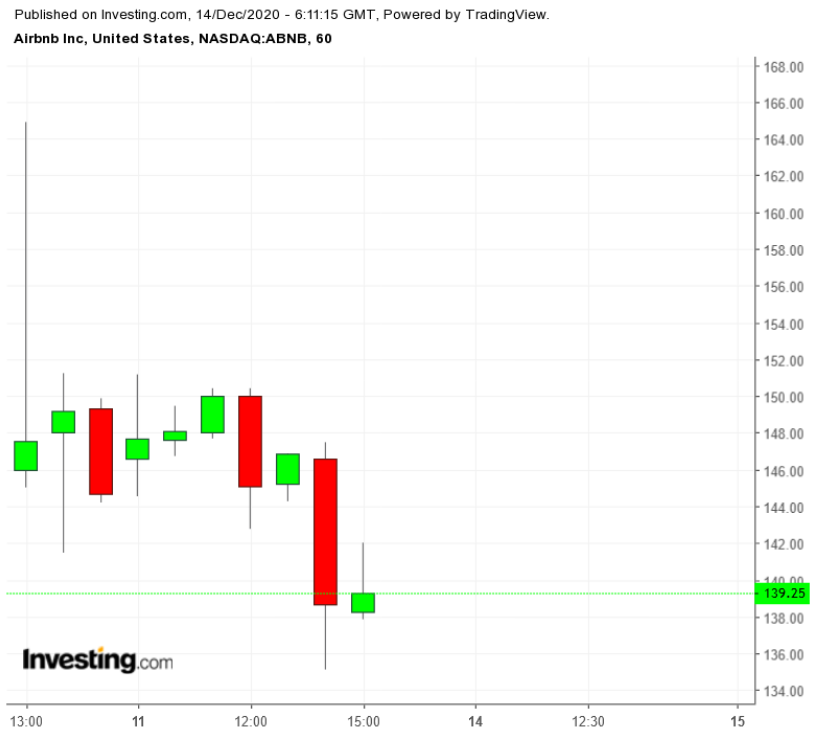Airbnb (NASDAQ:ABNB) went public last week and its debut proved to be a resounding success. Shares of the San Francisco-based vacation rental platform opened at $146, skyrocketing from the IPO price of $68, giving the firm a $100-billion valuation.

Clearly, this isn’t an ordinary performance for the middle of a devestating pandemic which has decimated the global travel industry and pushed many international firms to the brink of bankruptcy.
After its eye-popping debut, Airbnb is now worth more than five times the implied post-money valuation of its debt, raised back in April, according to PitchBook. As well, its market capitalization is now more than the combined market values of several of its largest hotel competitors.
This robust demand for Airbnb shares clearly shows that investors have great faith in the company’s business model which, they believe, can withstand one of the harshest operating environments existent for hospitality and travel companies.
The global pandemic has been challenging for Airbnb, which saw demand for short-term rentals dry up in its busiest and most expensive business hubs. Its revenue fell 18% during the third quarter compared with 2019. That was far less than Marriott International (NASDAQ:MAR), which reported a 57% drop in sales, and online travel agency Expedia Group (NASDAQ:EXPE), whose revenue declined 58%.
Nonetheless it was still able to perform much better than airlines, hotel brands, and cruise lines by pivoting to a redefined strategy.
Flexible Business Model
After remaining afloat when liquidity dried up last spring, Chief Executive Brian Chesky has quickly shifted his strategy to focus on local stays when travelers began avoiding taking flights during the first wave of the pandemic.
Airbnb’s relative resilience in an historically bad year for the travel industry is a result of a flexible business model that allowed the company to meet customers in the places they wanted to go. That meant city dwellers fleeing to less crowded locations or families and groups looking to vacation close to home.
While these strengths are very much reflected in the success of Airbnb's IPO, the big question for retail investors is whether this is the right time to buy this stock? According to some Wall Street analysts, Airbnb’s journey from here is very much a function of the post-pandemic recovery in the travel industry and how well the company is positioned to benefit from it.
“They’re going to be figuring out how to make it safe, how to make it convenient and how to make it affordable for everyone who is looking for alternative solutions,” Michael Seibel, partner at Y Combinator, told CNBC last week.
“And then I think the second thing that’s most interesting is that the future of work, as we all are working from home, Airbnb is in the best position to support workers who are now basically able to blur the lines between a one- to two-week vacation rental and a one-year apartment rental. So I think there are a lot of great opportunities ahead.”
Another distinguishing factor for a disruptor like Airbnb is that it’s very popular among millennials, who are the largest group of consumers now, and generation Z (anyone born between 1995 and 2015), which is the future. As Bloomberg analysis put it:
“The company is a brand the new generation of millennial investors grew up using. Such name recognition can help cement the company as the place to go for short-term rentals. It also means Airbnb has to spend a lot less money on advertising, helping profitability.”
Despite this bright outlook, no business comes without risks. In the case of Airbnb, cities are introducing stricter regulations after a backlash against the platform from long-term residents. And what travel will look like post-pandemic is still just speculation.
It might take years for normal travel demand to return after the pandemic. Thus, despite the flexible nature of Airbnb’s business model, it might continue to live with fewer trips from business travellers as videoconferencing becomes a norm.
Bottom Line
We believe Airbnb is a great travel stock to own and should be complementing an existing, balanced portfolio. That said, it’s not advisable to buy a stock right after it experienced IPO euphoria. The smarter strategy is to wait and look for a better entry point.
